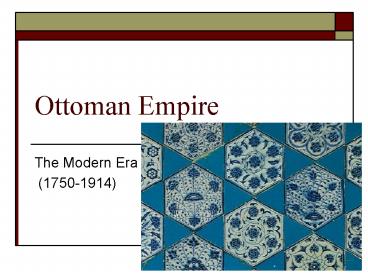Ottoman Empire - PowerPoint PPT Presentation
1 / 17
Title:
Ottoman Empire
Description:
Ottoman Empire. The Modern Era (1750-1914) The acorn says... Compare reaction to foreign interference in the Ottoman Empire (and China, India, ... – PowerPoint PPT presentation
Number of Views:2043
Avg rating:3.0/5.0
Title: Ottoman Empire
1
Ottoman Empire
- The Modern Era
- (1750-1914)
2
The acorn says
- Compare reaction to foreign interference in the
Ottoman Empire (and China, India, SE Asia,
Japan) - Muhammad Ali
- Suez Canal
3
Remember the Ottomans?
- Conquered Constantinople in 1453 Istanbul
- Golden Age under Suleyman Magnificent in mid
16th c. - Gunpowder empire Janissaries
- Blend Byzantine, Arab, Persian styles
- Dominate overland trade routes
4
Ottoman Empire at beginning of Modern Era
5
Ottoman Decline (18th 19th c.) --the Sick
Man of Europe
- Government corruption, ineptitude, series of
assassinations - Competition from European products usurpation
of trade routes by Europeans led to economic
decline - Intellectual stagnation
6
Challenges to the Ottoman Empire
- The West In 1798, Napoleon invaded the Muslim
heartland of Egypt quickly conquered weak
Ottoman Egyptian forces. He was only expelled
because of British aid/alliance. - Decentralization As the empire decayed,
regional forces from within the Empire began to
emerge. - Inspired by Enlightenment ideas nationalistic
fervor, Christian regions of the Balkans rebelled
with European encouragement achieved
independence. - Muhammad Ali strengthens separates Egypt
7
Greek War for Independence 1821-1832
8
Crimean War 1854-1856
- Otto, FR, Brit v. Russia
- Origins Russian expansionism conflict over
holy lands - Changing Warfare used railways telegraphs and
female nurses - Ended with agreement to respect Ottomans
independence territorial integrity --keep The
sick man of Europe around to preserve the
balance of power
9
Muhammad Ali Father of Modern Egypt
- Ottoman sultan appointed him as governor (pasha)
over Egypt in 1805. - Instituted LOTS of reforms
- Land reform
- Tax system
- Euro-style bureaucracy
- Agricultural improvements led to LOTS of cotton
production --Egypt became one of worlds largest
cotton producers - Modern printing press education systems
- Military reformed along Euro lines
- Even tried to overthrow Ottomans but prevented
by French British --why would the French
British care/interfere???
10
British take over Egypt
- When Muhammad Ali died in 1848, Egypt was
- most powerful state in Mid East, but it
quickly declined. - Completion of Suez Canal in 1869 made Egypt of
vital strategic importance to the British as a
link to their colonies in India, Africa, E SE
Asia. - Modernization (including the canal) was expensive
Egypt had a LOT of foreign debt. - After the US Civil War when world cotton market
collapsed from overproduction, Egypt couldnt pay
its international debts. - So, Britain took control of state finances
the Suez Canal. After putting down the Mahdist
nationalist uprising in Sudan (which Egypt
controlled), Britain made Egypt a protectorate in
1882.
11
The Suez Canal gives the lions share to the
British with the key to India
12
Ottoman Attempts at Reform
- Ottomans realized they needed to make drastic
reforms by mid 19th c. - Tanzimat (reorganization) Reforms various
attempts to modernize the Ottoman Empire, to
secure its territorial integrity against
nationalist movements and aggressive powers.
These reforms included establishing established
Western-style universities, a state postal
system, railways, extensive legal reforms, and
even resulted in creation of new constitution in
1876. - The reforms also encouraged Ottomanism among the
diverse ethnic groups, attempting to limit
growing nationalist movements within the Ottoman
Empire. The reforms attempted to integrate
non-Muslims and non-Turks more thoroughly into
Ottoman society by enhancing their civil
liberties and granting equality. EXCEPT for
Armenians who were treated as scapegoats were
increasingly attacked by the Ottomans. - Sent military officers to Western Europe to learn
military system, but also learned languages
were exposed to western culture ideas about
govt, democracy, religion, social order. - Implemented agricultural reforms modernized
medicine which led to population increase,
resulting in little real improvement in standard
of living ?
13
An Ottoman Resurgence?
14
Varied Reaction to European Domination
- Westernization copy the social, political,
economic, military structure of West. Usually
these reforms affected only educated elites
political change was superficial. - Nationalism which kind do you think?? which
led to attacks on religious ethnic minorities
who had been living in relative peace for
centuries. - Resistance some hated Euro political economic
domination that often accompanied reform lots of
anti-Western riots wars with European countries - Islamic Fundamentalism especially in Sudan as
led by Mahdi in 1881.
15
Demise of the Ottoman Empire
- By the end of the 19th c, only the Ottomans
remained as an important independent Muslim state
but it was really weak. - Reforms were too little, too late
- In early 20th c, group of liberals known as Young
Turks deposed the autocratic ruler instituted
more reforms. But they ended up supporting
Germany Austria-Hungary in WWI, after the war
the empire was broken up occupied by foreign
powers. - From its ruins, a new Islamic state, the Republic
of Turkey rose.
16
The Ottoman Empire in 1914
17
(No Transcript)































